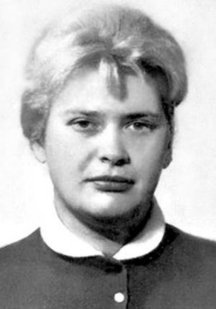
Alla Horska
Born: September 18, 1929 in Yalta, Crimea
Died: November 28, 1970 in Vasylkiv, Ukraine
Alla Horska was a Ukrainian Monumentalist painter and a Shistdesyatnyky, a group of literati, artists and scholars of the 1960s in Ukraine who, publically and artistically acknowledged the criminal nature of the soviet communist system and rejected dogmas of ‘socialist realism.’ Their aim was to preserve Ukraine’s culture and language through art. Horska did this in part by being a founder of the Kloob Tvorchoyi Molodi (Creative Youth Club). She is best known for her artistic collaborations on murals, mosaics, stain glass, portrait paintings and samvydav, self-published literature. Due to the subversive political and nationalistic subject of her art, pro-soviets and the KGB often destroyed, deterred and even banned her work from public display. She was expelled multiple times from the Union of Artists of Ukraine for it, leaving her professionally blacklisted in Kyiv and unable to work. Horska also dedicated much of her time to supporting fellow artists who had been arrested and convicted as “soviet dissidents,” often giving court testimony on their behalf and offering support to their families while they were in labor and concentration camps. She’s best known for her Ukrainian nationalism and activism and being the “artistic and spiritual” leader of the 1960s art movement while Ukraine was under communism and part of the USSR.
Born to Oleksandr Horska, a pioneer of Ukrainian cinema, art was in her blood. She went to study it at the Kyiv State Art Institute to develop her talent. She married fellow artist, Viktor Zaretsky. She was murdered in 1970. Though technically unresolved, an independent organization investigated her murder in the 1990s. Evidence points to the KGB as “instrumental in her death,” no doubt as a result of her artistic politics.


